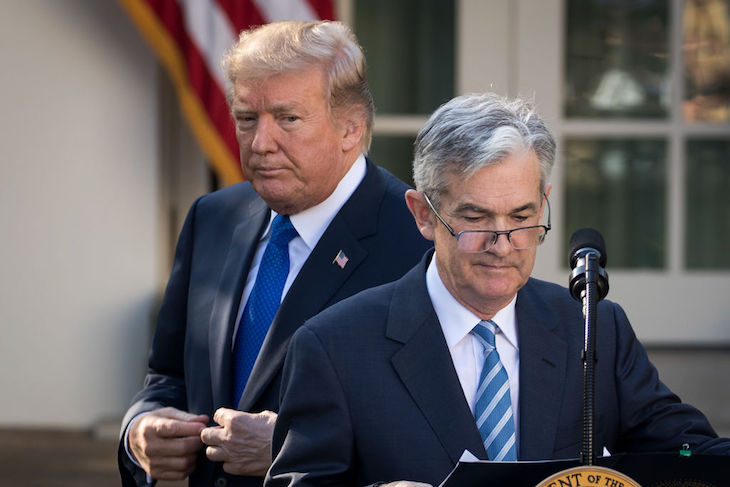Perhaps we should be relieved that Donald Trump has made a dull appointment to succeed Janet Yellen as chairman of the Federal Reserve, America’s central bank. He might have picked another alt-right wacko or Kremlin stooge — or his Las Vegas buddy Phil Ruffin, the casino owner he allegedly thought of sending as envoy to China. But in fact he has chosen Jerome ‘Jay’ Powell, an identikit lawyer-turned-banker who has been called the candidate of ‘continuity’ and ‘compromise’ after a late run to beat frontrunner Kevin Warsh, a former Trump adviser with more aggressive opinions on the need for monetary tightening.
The most interesting facts about Powell are that (unlike recent Fed incumbents) he is not an economist but he is rich: one guess says he’s worth $112 million, some of it made when he worked for the private equity group Carlyle, which has been described (in Dan Briody’s book The Iron Triangle) as operating at the ‘murky intersection’ of Washington politics, national security and private capital. So he’s an insider and a plutocrat — but is he the man for the job?
His test will come when US stocks plunge from current highs and Wall Street howls for cheap money again; and when Trump’s tax cuts overheat the economy but the White House doesn’t want the feelgood factor quelled by faster-rising rates. The Washington Post asks: ‘Does [Trump] think, of all the plausible candidates, Powell would be the easiest to influence or intimidate?’ But my man who pours the decaf at Fed board meetings says Powell’s better than that: ‘Pragmatic, mainstream, the best pick Trump could have made once he decided not to reappoint Yellen.’ Dullness isn’t necessarily bad in a central bank governor, so long as it’s accompanied by firmness under fire.
Sin in Paradise
What would a perfect tax system look like? For companies, profit taxes should be competitively low, to encourage inward investment, with generous reliefs for start-ups, research and capital projects; the corporate tax code should be designed to generate rising productivity and prosperity rather than to maximise short-term tax revenues, and companies should acknowledge a duty to contribute wherever their profits arise. For individuals, income tax rates should rise only to the lowest level that maximises revenue collection and thresholds should be high enough to keep low earners out of the net, while pension savers and first-time home-buyers should be incentivised. Citizens and companies alike should be proud to pay fair taxes without feeling penalised; and tax consultants should be as rare as taxidermists.
But of course it’s not like that. And so we’ve had to endure this week’s indigestible splurge of revelations from the so-called Paradise Papers — presented by the BBC in tones of wealth-hating venom that entirely failed to distinguish between cunning wheezes to help the expensively advised avoid paying taxes where they live, and the embarrassment of a small offshore holding discovered deep in the investment port-folio of the Duchy of Lancaster, an otherwise admirable property business that happens to pay the monarch’s salary.
Gratuitous smearing of the Queen faded as even juicier celebrity names came into the frame, but the episode has left a nasty taste. Meanwhile, we might reflect that morality seems to have evolved as much in taxation as it has in flirtation, for which the rules are so rapidly changing. It used to be accepted that individuals were morally entitled to pay as little tax as the law’s complexities and loopholes permitted — and that companies had a positive duty to shareholders to do likewise. Now there’s a growing sense that such self-interest is sinful because it denies revenues for public good. We might want to argue with that, but it’s the way the Corbyn-driven public mood is shifting. And the only answer — Chancellor Hammond please note, as you embark on your umpteenth Budget draft —is taxes that are as low, simple and cheat-proof as possible.
Raffish style
As a Far East nostalgia buff I’m delighted that a Peninsula Hotel is coming to Hyde Park Corner. Last week’s groundbreaking ceremony for this 190-room sister to the original Peninsula, opened in Kowloon in 1928, was presided over by Sir Michael Kadoorie, third generation of the Hong Kong family who also created splendid hotels in Shanghai and Peking between the wars. So the £500 million project bodes well — but the opulent new building facing the Wellington Arch replaces a 1960s office block that, for me, also stirred memories.
It was once the headquarters of Lord Hanson, corporate titan of the Thatcher era, who was a keen Spectator reader. Having apparently enjoyed a piece of mine about British cheese-making, in the summer of 1995 he invited me to lunch. The other guests were the biochemist Sir Richard Sykes, chairman of the drugmaker Glaxo Wellcome, and the broadcaster Selina Scott — who, it would be fair to say, received the lion’s share of the charm Hanson (then 73) had exercised in his playboy youth on Audrey Hepburn and Joan Collins.
He and Sykes both hailed from Huddersfield but otherwise seemed to have little in common. They represented very different ways of business: what was then Hanson Trust had risen to stardom by opportunist, cost-stripping takeovers, while what is now GlaxoSmithKline was built on huge investment in laboratory research. When Sykes started talking about advances in HIV/Aids treatment, our host flashed a smile at Selina: ‘We’re not here to talk about queers.’ Then briefly to me: ‘Let’s talk about cheese.’
Glaxo’s ‘big pharma’ model endures, as does the Kadoories’ dynastic stewardship of the hotels. But the Hanson empire did not outlive its founder, who died in 2004, and its core building-materials business now belongs to a German cement company. Still, James Hanson brought raffish style to the business scene in his day: the new Peninsula should name a cocktail after him.







Comments